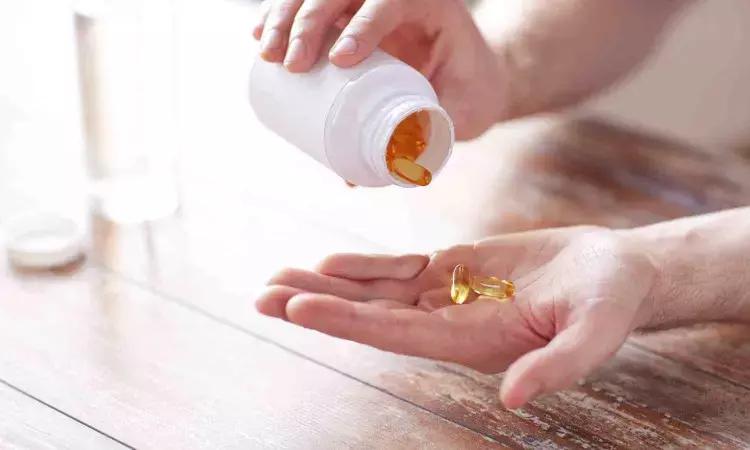- Home
- Medical news & Guidelines
- Anesthesiology
- Cardiology and CTVS
- Critical Care
- Dentistry
- Dermatology
- Diabetes and Endocrinology
- ENT
- Gastroenterology
- Medicine
- Nephrology
- Neurology
- Obstretics-Gynaecology
- Oncology
- Ophthalmology
- Orthopaedics
- Pediatrics-Neonatology
- Psychiatry
- Pulmonology
- Radiology
- Surgery
- Urology
- Laboratory Medicine
- Diet
- Nursing
- Paramedical
- Physiotherapy
- Health news
- Fact Check
- Bone Health Fact Check
- Brain Health Fact Check
- Cancer Related Fact Check
- Child Care Fact Check
- Dental and oral health fact check
- Diabetes and metabolic health fact check
- Diet and Nutrition Fact Check
- Eye and ENT Care Fact Check
- Fitness fact check
- Gut health fact check
- Heart health fact check
- Kidney health fact check
- Medical education fact check
- Men's health fact check
- Respiratory fact check
- Skin and hair care fact check
- Vaccine and Immunization fact check
- Women's health fact check
- AYUSH
- State News
- Andaman and Nicobar Islands
- Andhra Pradesh
- Arunachal Pradesh
- Assam
- Bihar
- Chandigarh
- Chattisgarh
- Dadra and Nagar Haveli
- Daman and Diu
- Delhi
- Goa
- Gujarat
- Haryana
- Himachal Pradesh
- Jammu & Kashmir
- Jharkhand
- Karnataka
- Kerala
- Ladakh
- Lakshadweep
- Madhya Pradesh
- Maharashtra
- Manipur
- Meghalaya
- Mizoram
- Nagaland
- Odisha
- Puducherry
- Punjab
- Rajasthan
- Sikkim
- Tamil Nadu
- Telangana
- Tripura
- Uttar Pradesh
- Uttrakhand
- West Bengal
- Medical Education
- Industry
Fish Oil Use Linked to Lower Vascular Risks in Type 2 Diabetes Patients: Study

China: Regular consumption of fish oil supplements and elevated levels of omega-3 polyunsaturated fatty acids (PUFAs), particularly docosahexaenoic acid (DHA), are linked to reduced vascular complication risks in individuals diagnosed with type 2 diabetes (T2D), a recent study has found.
The findings, published in The Journal of Clinical Endocrinology & Metabolism, suggest that the positive correlations were partly explained by enhancements in lipid profile and reduction in inflammation biomarkers.
Fish oils, abundant in omega-3 polyunsaturated fatty acids (PUFAs), are recognized for their vascular health benefits in the general population. However, studies investigating their effects on individuals with type 2 diabetes (T2D), who face an elevated risk of vascular disease, are limited.
To fill this knowledge gap, Gang Liu, Huazhong University of Science and Technology, Wuhan, China, and colleagues aimed to evaluate associations of fish oil supplementation and plasma omega-3 PUFAs with risks of macrovascular and microvascular complications among people with type 2 diabetes. They further explored the potential mediating role of metabolism-related biomarkers.
This study comprised 20,338 participants with type 2 diabetes from UK Biobank. Participants' use of regular fish oil supplementation was assessed through an electronic questionnaire administered at baseline from 2006 to 2010. Blood samples collected between 2019 and 2020 were analyzed for omega-3 fatty acids.
The study focused on diabetic macrovascular complications (including coronary heart disease, heart failure, peripheral artery disease, and stroke) and microvascular complications (such as diabetic kidney disease, diabetic retinopathy, and diabetic neuropathy). Biomarkers associated with cardiovascular disease were assessed in the blood samples obtained during recruitment.
The study revealed the following findings:
- During 13.2 years of follow-up, 5,396 people developed macrovascular complications, and 4,868 people developed microvascular complications.
- After multivariable adjustment, hazard ratios (HRs) for patients with fish oil were 0.90 for composite macrovascular complications, 0.91 for coronary heart disease (CHD), 0.72 for peripheral artery disease, and 0.89 for composite microvascular complications, 0.87 for diabetic kidney disease, and 0.88 for diabetic retinopathy.
- Higher n-3 PUFA levels, especially docosahexaenoic acid (DHA), were associated with lower risks of macrovascular and microvascular complications. Comparing extreme quartiles of plasma DHA, the HRs were 0.68 for composite macrovascular complications, 0.63 for CHD, and 0.59 for diabetic neuropathy.
- Biomarkers, including lipid profile and inflammation, collectively explained 54.4% and 63.1% of associations of plasma DHA with risks of composite macrovascular complications and CHD.
"Regular use of fish oil supplements and elevated plasma levels of omega-3 PUFAs, particularly DHA, were linked to reduced risks of macrovascular and microvascular complications in individuals with type 2 diabetes. The beneficial effects observed were partly attributed to improvements in lipid profile and reduction in inflammation biomarkers," the researchers concluded.
Reference:
Tian, S., Guo, T., Qian, F., Qiu, Z., Lu, Q., Li, R., Zhu, K., Li, L., Yu, H., Li, R., Ou, Y., Pan, A., & Liu, G. Fish Oil, Plasma n-3 PUFAs, and Risk of Macro- and Microvascular Complications among Individuals with Type 2 Diabetes. The Journal of Clinical Endocrinology & Metabolism. https://doi.org/10.1210/clinem/dgae482
Dr Kamal Kant Kohli-MBBS, DTCD- a chest specialist with more than 30 years of practice and a flair for writing clinical articles, Dr Kamal Kant Kohli joined Medical Dialogues as a Chief Editor of Medical News. Besides writing articles, as an editor, he proofreads and verifies all the medical content published on Medical Dialogues including those coming from journals, studies,medical conferences,guidelines etc. Email: drkohli@medicaldialogues.in. Contact no. 011-43720751


